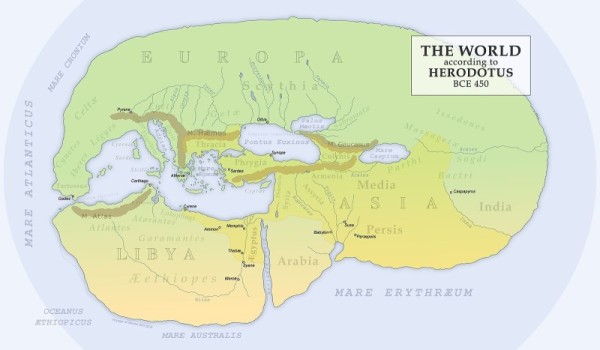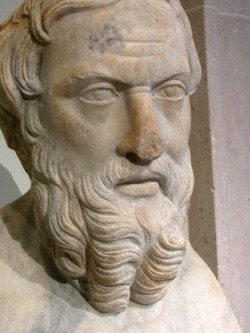This they say was the first beginning of the evil deeds of Cambyses; and next after this he put to death his sister, who had accompanied him to Egypt . . . .

Translated by George C. Macaulay — our special project presenting the complete Herodotus with URLs for all of those people, places, events, and things which baffles and discourages modern readers.
Previously on Herodotus
30. Him, when he had brought his life to an end by reason of the wound, the priests buried without the knowledge of Cambyses: but Cambyses, as the Egyptians say, immediately after this evil deed became absolutely mad, not having been really in his right senses even before that time: and the first of his evil deeds was that he put to death his brother Smerdis, who was of the same father and the same mother as himself. This brother he had sent away from Egypt to Persia in envy, because alone of all the Persians he had been able to draw the bow which the Ichthyophagoi brought from the Ethiopian king, to an extent of about two finger-breadths; while of the other Persians not one had proved able to do this. Then when Smerdis had gone away to Persia, Cambyses saw a vision in his sleep of this kind:–it seemed to him that a messenger came from Persia and reported that Smerdis sitting upon the royal throne had touched the heaven with his head. Fearing therefore with regard to this lest his brother might slay him and reign in his stead, he sent Prexaspes to Persia, the man whom of all the Persians he trusted most, with command to slay him. He accordingly went up to Susa and slew Smerdis; and some say that he took him out of the chase and so slew him, others that he brought him to the Erythraian Sea and drowned him.
31. This they say was the first beginning of the evil deeds of Cambyses; and next after this he put to death his sister, who had accompanied him to Egypt, to whom also he was married, she being his sister by both parents. Now he took her to wife in the following manner (for before this the Persians had not been wont at all to marry their sisters):–Cambyses fell in love with one of his sisters, and desired to take her to wife; so since he had it in mind to do that which was not customary, he called the Royal Judges and asked them whether there existed any law which permitted him who desired it to marry his sister. Now the Royal Judges are men chosen out from among the Persians, and hold their office until they die or until some injustice is found in them, so long and no longer. These pronounce decisions for the Persians and are the expounders of the ordinances of their fathers, and all matters are referred to them. So when Cambyses asked them, they gave him an answer which was both upright and safe, saying that they found no law which permitted a brother to marry his sister, but apart from that they had found a law to the effect that the king of the Persians might do whatsoever he desired. Thus on the one hand they did not tamper with the law for fear of Cambyses, and at the same time, that they might not perish themselves in maintaining the law, they found another law beside that which was asked for, which was in favour of him who wished to marry his sisters. So Cambyses at that time took to wife her with whom he was in love, but after no long time he took another sister. Of these it was the younger whom he put to death, she having accompanied him to Egypt.

CC BY-SA 2.0 image from Wikipedia.
32. About her death, as about the death of Smerdis, two different stories are told. The Hellenes say that Cambyses had matched a lion’s cub in fight with a dog’s whelp, and this wife of his was also a spectator of it; and when the whelp was being overcome, another whelp, its brother, broke its chain and came to help it; and having become two instead of one, the whelps then got the better of the cub: and Cambyses was pleased at the sight, but she sitting by him began to weep; and Cambyses perceived it and asked wherefore she wept; and she said that she had wept when she saw that the whelp had come to the assistance of its brother, because she remembered Smerdis and perceived that there was no one who would come to his assistance. The Hellenes say that it was for this saying that she was killed by Cambyses: but the Egyptians say that as they were sitting round at table, the wife took a lettuce and pulled off the leaves all round, and then asked her husband whether the lettuce was fairer when thus plucked round or when covered with leaves, and he said “when covered with leaves”: she then spoke thus: “Nevertheless thou didst once produce the likeness of this lettuce, when thou didst strip bare the house of Cyrus.” And he moved to anger leapt upon her, being with child, and she miscarried and died.
33. These were the acts of madness done by Cambyses towards those of his own family, whether the madness was produced really on account of Apis or from some other cause, as many ills are wont to seize upon men; for it is said moreover that Cambyses had from his birth a certain grievous malady, that which is called by some the “sacred” disease: and it was certainly nothing strange that when the body was suffering from a grievous malady, the mind should not be sound either.
– Herodotus, Book III
| <—Previous | Master List | Next—> |
Herodotus made his living by being interesting. In a world where most people did not read and could not afford to buy a book even if they could, they would pay to listen to Herodotus recite from his books. They would not pay to be bored. In that world, the names that populate his stories would have some general familiarity to his audience. Their obscurity to us is a barrier that this series seeks to break down.
MORE INFORMATION
MAP LIBRARY
Because of lack of detail in maps as embedded images, we are providing links instead, enabling readers to view them full screen.

Leave a Reply
You must be logged in to post a comment.